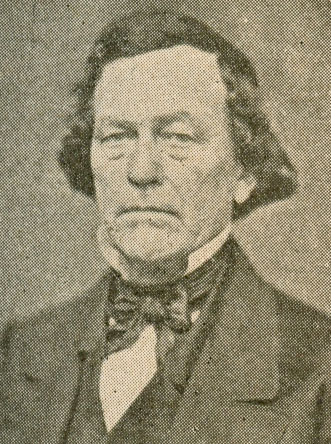Archive:The Descendants of John Whitney, page 249
Archives > Extracts > Archive:The Descendants of John Whitney > The Descendants of John Whitney, page 249
The Descendants of John Whitney, Who Came from London, England, to Watertown, Massachusetts, in 1635, by Frederick Clifton Pierce (Chicago: 1895)
Transcribed by the Whitney Research Group, 1999.
| Previous page | Next page |
| WHITNEY GENEALOGY. | 249 |
1827, justice of the peace from 1827 to 1832, was one of the organizers of the Congre- gational church in 1815. In 1830 he moved to New York state and died at Law- renceville. He d. July 30, 1869; res. Lawrenceville, N. Y. 3760. i. LUTHER, b. July 26, 1815; m. Rebecca J. IRWIN. 3761. ii. EDGAR, b. June 25, 1818; m. Maria R. SHEPARD and Sarah CHURCH. 3762. iii. JOSHUA, b. Jan 25, 1820; d. unm., Mobile, Ala. 3763. iv. PASCAL, b. Nov. 4, 1823; m. Pema SHEPARD and Amanda ROCKWELL. He d. dec. 3, 1883; res. Osage, Ia. 1799. DANIEL WHITNEY (Samuel, Joseph, Timothy, John, John, John), b. Gil- sum, N. H., Sept. 3. 1795; m. at Middlebury, Vt., Sept. 1, 1826, Emeline S. HENSHAW, b. Middlebury, Vt., July 21, 1803; d. Oct 25, 1890. The deceased will be long remem- bered for her true Christian character and her charitable deeds. Her benefactions were performed without ostentation, bringing life and joy where sickness and poverty had laid their withering hand. Her influence, like that of the rain upon the thirsty
land, was always for good. The writer of this item desires to lay a wreath of immortelles upon her resting place in the memory of her deeds during dire sickness many long years ago--ministrations that were as pure and hallowed as the manna that fell from Heaven--and it was a sample act of her daily life. [Green Bay paper.] Mr. WHITNEY was born in the town of Gilsum, N. H., Sept. 3, 1795, and went to Green Bay, Wis., in the summer of 1819, being 24 years of age. He established him- self in merchantile business near Camp Smith, two and a half miles above the present site of Green Bay, where the village then was, and this was the starting point of all his numerous enterprises. He was the first American who opened a store and it was the most extensive west of the lakes. Wisconsin and all the west and north, was then an entire wilderness, inhabited only by the wild Indians, comprising within the limits of the present state at least six different nations, and other nations still more fierce and warlike held all the country west of the Mississippi. This did not prevent him from making long journeys to the interior, and pushing his investigations whenever he thought good loca- tions for trade could be found. He explored the Fox river to its source, and the Wis- consin from the rapids to the Mississippi. In 1821-22 he was sutler for U.S. troops at Fort Snelling on the St. Peter's river, Minnesota. He established several trading posts on the Mississippi, where he supplied traders with goods; and had also a trading post at Sault St. Marie. During the winter of 1822 he traveled on foot from Fort Snelling to Detroit, with only an Indian for a companion to assist him with his provisions and bedding, which they drew on a hand sled. During this whole journey (about 1,000 miles) he met but one white man and saw but two cabins. An incident occured on this trip, which showed the preseverence and daring of the man. In crossing one of the numerous rivers on the route, he found the ice bad. The Indian guide was afraid. Mr. WHITNEY crossed over and drew the sled and loading with him. The Indian would not follow. Mr. W. recrossed; Indian would not be persuaded to try it; Mr. W. had broken through with one foot, ice was thin, the water was deep and the cur- rent strong. Mr. WHITNEY provided himself with a rope from the sled and a cudgel, and compelling the Indian to lie down upon the ice, with the rope drew him over in safety. In the fall of 1824 he had a vessel, loaded with goods and provisions for Green Bay, frozen in near Mackinac. As such an accident in those times threatened serious consequences to the settlements, and, although starvation was impossible when fish and venison were plenty, yet many must suffer inconvenience, and Mr. W. great loss, unless supplies could be reached. As soon, therefore, as cold weather had insured a bridge of ice along shore, and across the rivers and bays, he fitted out an expedition consisting of himself and several Canadian Frenchmen with horse-trains, and made the trip to Mackinac on the ice, where the vessel was, and returned with all he could put on, of the most necessary goods. In order to carry on his extensive operations he went several times to Canada and procured large numbers of men used to voyaging and the trader's life. With these as companions and assistants he traversed the country on foot, in the bark canoe and the Mackinac boat, exploring new sections of country, and transporting goods to his trading houses. Many of these men are still in the county and have
| Previous page | Next page |
Copyright © 1999, 2006 The Whitney Research Group
